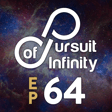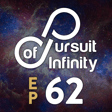
25. Interview: Sam Stanford
In this week’s episode, we sit down with Sam Stanford. Sam is a Physicist & Structural Engineer for Jacobs Engineering and the host of a science and education podcast called Everything STEAM. STEAM being an acronym, and if you’re not sure what it stands for, listen on to hear Sam explain it! He currently serves as a STEAM Ambassador for the Jacobs Engineering Pittsburgh office to organize education events for the public. Sam also is a Wisdom App Mentor. On the Wisdom App, Sam holds short discussions on Physics phenomena such as the concept of time, gravity, the electromagnetic spectrum and much more. In the near future, he plans to apply for a Masters program that marries his two knowledge passions which are Physics & Structural Engineering.
Sam's Website:
https://everythingsteam.org/
Everything STEAM Podcast: https://open.spotify.com/show/06HUFJ2LYtPhSH6xqe5fkh
Elite ECO LITE Apparel:
https://www.elitegraphix.org/ecolite
_________________
Music By Nathan Willis RIP
Follow Pursuit Of Infinity:
www.PursuitOfInfinity.com
Discord: https://discord.io/pursuitofinfinity
YouTube: https://www.youtube.com/channel/UCPpwtLPMH5bjBTPMHSlYnwQ
Spotify: https://open.spotify.com/show/58he621hhQ7RkajcmFNffb
Apple Podcasts: https://podcasts.apple.com/ca/podcast/pursuit-of-infinity/id1605998093
Instagram: https://www.instagram.com/pursuitofinfinitypod/
Patreon: Patreon.com/PursuitOfInfinity



















